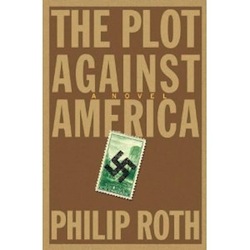Published: 2004
Author: Philip Roth
A fantastic concept which doesn’t quite convince
One of fiction’s most fascinating questions is What If? What If a character didn’t exist? What If a lie was discovered? What If history was different? Many books and films have explored this question from different viewpoints including Fatherland by Robert Harris, Sliding Doors and It’s A Wonderful Life. Philip Roth’s counter-factual novel The Plot Against America challenges us to consider one of the most intriguing What Ifs possible. What If, during World War II, the President of America was a Nazi sympathiser? What If American Jews started to experience the same discrimination and restrictions as their European counterparts?
The narrator of the story is nine year old Jewish boy, Philip Roth who lives in New Jersey with his parents, Herman and Bess, and his brother Sandy. This isn’t just an alternative view of US and world history, this is a completely different version of Roth’s own life which he has created.
Instead of a third Roosevelt victory in 1940, the charismatic and youthful Republican candidate Charles Lindbergh is elected. The famous aviator promises that America will not become part of the unpopular war raging in Europe and signs a non-aggression pact with Nazi Germany.
Although the Jewish community is concerned, there is no immediate legislation comparable to the Nuremberg Laws which stripped Germany’s Jews of their civil rights. Worrying events such as minor displays of anti-semitism, grow slowly over time and culminate in violence against property and individuals. Creeping discrimination becomes normalised until physical attacks are accepted as the inevitable next step.
Roth clearly understands the path to genocide and that it doesn’t just happen overnight. Genocide begins with small incidents such as the mysterious cancellation of a hotel booking, grows to property being damaged and escalates into violence. As I read the book I was waiting for an event similar to the 1938’s Kristallnacht when Jewish homes, shops and synagogues across Germany and Austria were destroyed. The Plot Against America includes a comparable event and that emphasised one of my main problems with the book – nothing came as a surprise. Maybe it wasn’t meant to, perhaps the path of America’s Jews was set in stone as soon as Lindbergh was elected. The inevitability of such a progression certainly makes sense from an historical perspective, but doesn’t make for a gripping work of fiction.
It may be because I’ve spent a lot of time in the past few years researching genocides, but I also spotted parallels between Lindbergh’s America and Pol Pot’s Cambodia as Jewish families are moved from their suburban homes to work in rural settings, far away from friends and family. The disappearance of Lindbergh’s plane and the blame subsequently laid at the door of Jewish interests was reminiscent of the event which triggered the Rwandan genocide in 1994. These similarities serve to emphasise how genocide in different countries and different cultures follow similar recognisable and preventable patterns.
The Plot Against America is a brilliantly written book but I’m not sure that it’s one that is all that enjoyable. The topic is frightening and cleverly created but I didn’t entirely connect with the characters which made me feel detached from their plight. I also felt let down by the last couple of chapters which seemed to rush through some of the most interesting aspects of the narrative and we never discover what happens to the Roth family after 1942.
The Plot Against America asks a fascinating What If, but the novel doesn’t deliver on the promise of such an exciting concept.


